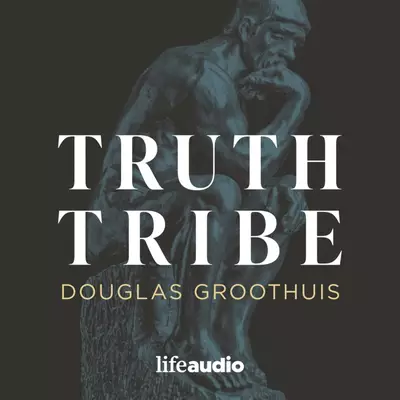
Jesus and Mohammad
Full show notes at https://www.lifeaudio.com/truth-tribe-with-douglas-groothuis/episodes
Religious Founders
- The concern for truth and rationality
- Truth: what corresponds to reality. See Douglas Groothuis, Truth Decay.
- Rationality: testing truth-claims logically and by the evidence
- Categories of analysis: Sources of information, life, worldview, existential meaning
Jesus (0-33 AD)
- Source of knowledge: the New Testament: Gospels, Acts, Epistles, Revelation
- Gospels: Written by eyewitnesses or those who consulted them
- Synoptic gospels: Matthew, Mark, Luke—approximately 70-80 AD; John: 90 AD
Many have undertaken to draw up an account of the things that have been fulfilled among us, just as they were handed down to us by those who from the first were eyewitnesses and servants of the word. With this in mind, since I myself have carefully investigated everything from the beginning, I too decided to write an orderly account for you, most excellent Theophilus, so that you may know the certainty of the things you have been taught—Luke 1:1-4.
- Epistles of Paul: written in 50s AD; probably before the Gospels. See I Corinthians 15:1-8 on the gospel and resurrection of Jesus
- Jesus’ life
- Jewish itinerate teacher, preacher, prophet, healer, exorcist
- Taught the Kingdom of God has come (Matthew 4:17)
- Was crucified by the Romans
- Was worshiped by followers as resurrected from the dead (Romans 1:3-4)
Jesus’ worldview
- God: monotheism; Heavenly Father and Creator
- Human problem: sin (Mark 7:21-23)
- Solution to human problem: faith in Jesus’s work (John 3:16-18)
- Jesus as God Incarnate (Mark 2; John 8:58); second person of the Trinity (Matthew 28:18-20)
- Existential meaning
- Forgiveness, fellowship, meaning through Jesus Christ (Matthew 6:33; 1 Corinthians 15:58)
- Confidence in life and death (Romans 8)
Mohammad (570-632)
- Source: Koran (and Hadith and Sunna)
- Koran: One book received by one man from an angel; not written down by Mohammad, but others later
- 114 chapters: about the size of The New Testament
- Reinterprets Hebrew Bible and New Testament
- Hadith: commentary on Koran; Sunna: life of Mohammad
Mohammad’s life
- Received a revelation while meditating in a cave in 610 AD.
- Considered the last and greatest of the prophets: “seal of the prophets.”
- Life: Mecca and Medina
- Was a military, political, and spiritual leader after returning to Mecca from Medina
Mohammad’s worldview
- One God: Allah, monotheism
Say (O Muhammad): He is God, the One and Only; God, the Eternal, Absolute; He begetteth not, nor is He begotten; And there is none like unto Him.—Qur’an, Sura 112.
- Human problem: weakness, ignorance
- Human solution: confess Allah and obey his law
Existential meaning
- Strive for paradise, avoid hell
- Keep precepts: confession of faith, giving, pilgrimage to Mecca, observe Ramadan, pray five times daily
- Extend the Islam throughout the world, so that all obey Allah’s law (sharia)
Rational Assessment of Jesus and Mohammad
- The sources for Christ more varied and rooted in history than the sources for Mohammad.
- Mohammad’s claim to being a prophet is questionable, given his denial of the identity of Jesus (not God) and his denial of the biblical gospel (Galatians 1:6-11)
- Claims of Mohammad based on the beauty of Koran and the early success of Islam
- Beauty is not the same as truth; some scholars claim it is not beautiful, but confusing. That is why Hadith is needed to interpret it.
- The success of Islam does not argue in its favor, since might does not make right
Claims of Jesus are based on historical documents close to the events described (four Gospels)
- Qur’an and New Testament agree that:
- Jesus was born of the Virgin Mary (Qur'an, Surah 3:38-48)
- Jesus was a messenger (Qur’an, Surah 5:75)
- Jesus is sinless (Qur’an, Surah 19:9)
- Jesus was “the Messiah” (Qur’an, Surah 4:171)
- Jesus was “a word from God” (Qur’an, Surah 4:171)
- Jesus worked miracles (Qur’an, Surah 3:49)
- Jesus ascended to heaven (Qur’an, Surah 4:148)
- Jesus will come again—Second Coming (Qur’an, Surah 43:61)
Koran and New Testament disagree on whether or not
- Jesus claimed to be God (John 8:58; 10:30); Apostles claimed this as well (John 1:1-3; Colossians 2:9); contra: Qur’an 19:20, 24; 11

Follow Dr. Groothuis:
Website: https://www.DouglasGroothuis.com